|
|
|
Sort Order |
|
|
|
Items / Page
|
|
|
|
|
|
|
| Srl | Item |
| 1 |
ID:
144614
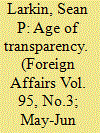

|
|
|
|
|
| Summary/Abstract |
Transparency has long been a rare commodity in international affairs. But today, the forces of technology are ushering in a new age of openness that would have been unthinkable just a few decades ago. Governments, journalists, and nongovernmental organ¬izations (NGOs) can now harness a flood of open-source information, drawn from commercial surveillance satellites, drones, smartphones, and computers, to reveal hidden activities in contested areas—from Ukraine to Syria to the South China Sea
|
|
|
|
|
|
|
|
|
|
|
|
|
|
|
|
| 2 |
ID:
144608
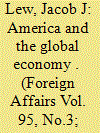

|
|
|
|
|
| Summary/Abstract |
When U.S. President Barack Obama [1] joined other global leaders at the G-20 summit in Turkey [2] in November 2015, the United States was in the final stages of a multiyear effort to secure the approval of a set of important reforms to the International Monetary Fund. The reforms, negotiated in 2010 with strong U.S. leadership, were designed to double the organization’s core financial resources to combat financial crises and to modernize its governance by increasing the voting shares of emerging-market economies [3] while maintaining a decisive U.S. voice. But their implementation had been on hold for several years, awaiting approval from Congress. Christine Lagarde, the IMF’s managing director, spoke for many when she opened the meeting in Turkey by saying she prayed that the United States would approve the reforms by the end of the year. Obama responded with a mix of levity and seriousness. “You don’t have to pray, Christine,” he said. “It will get done.”
|
|
|
|
|
|
|
|
|
|
|
|
|
|
|
|
| 3 |
ID:
144615


|
|
|
|
|
| Summary/Abstract |
As the UN Climate Change Conference in Paris came to a close in December 2015, foreign ministers from around the world raised their arms in triumph. Indeed, there was more to celebrate [1] in Paris than at any prior climate summit. Before the conference, over 180 countries had submitted detailed plans to curb their greenhouse gas emissions. And after two weeks of intense negotiation [2], 195 countries agreed to submit new, stronger plans every five years.
|
|
|
|
|
|
|
|
|
|
|
|
|
|
|
|
| 4 |
ID:
144611
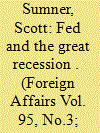

|
|
|
|
|
| Summary/Abstract |
Today, there is essentially one accepted narrative [2] of the economic crisis that began in late 2007. Overly optimistic homebuyers and reckless lenders [3] in the United States created a housing price bubble. Regulators were asleep at the switch. When the bubble inevitably popped, the government had to bail out the banks, and the United States suffered its deepest and longest slump since the 1930s. For anyone who has seen or read The Big Short, this story will be familiar.
|
|
|
|
|
|
|
|
|
|
|
|
|
|
|
|
| 5 |
ID:
144612
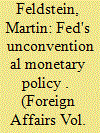

|
|
|
|
|
| Summary/Abstract |
Now, almost a decade after the Great Recession hit, the story of its origins and course has become familiar. It began in December 2007, soon after the U.S. housing bubble burst, triggering the widespread collapse of the U.S. financial system. Credit dried up, as banks lost confidence in the value of their assets and stopped lending to one another. Consumer spending plummeted. At first, the U.S. Federal Reserve tried to boost spending through traditional monetary policy [1], by reducing short-term interest rates. Yet this proved ineffective, even though short-term interest rates fell close to zero. The government then turned to fiscal stimulus [2], with Congress passing a package of tax cuts and spending increases in 2009, but this, too, proved ineffectual.
|
|
|
|
|
|
|
|
|
|
|
|
|
|
|
|
| 6 |
ID:
144613
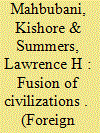

|
|
|
|
|
| Summary/Abstract |
The mood of much of the world is grim these days. Turmoil in the Middle East, causing hundreds of thousands of deaths and millions of refugees [1]; random terrorist attacks across the globe; geopolitical tensions in eastern Europe and Asia; the end of the commodity supercycle; slowing growth in China [2]; and economic stagnation [3] in many countries—all have combined to feed a deep pessimism about the present and, worse, the future.
|
|
|
|
|
|
|
|
|
|
|
|
|
|
|
|
| 7 |
ID:
144606
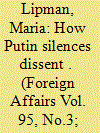

|
|
|
|
|
| Summary/Abstract |
In December 2015, the Russian antigraft activist Alexey Navalny [1] released a documentary [2] in which he exposed the corrupt business dealings of the children of Yuri Chaika, Russia’s prosecutor general—the top law enforcement official in the country. In the film, Navalny accuses Chaika’s son Artem of “continuously exploit[ing] the protection that his father, the prosecutor general of the Russian Federation, gives him to extort from and steal other people’s companies.” Artem owns a five-star hotel in Greece [3] with his father’s deputy’s ex-wife, who, according to Navalny, maintains close business ties with the wives of violent gang members in southern Russia. The film includes scenes from the inauguration of the hotel, a grand celebration attended by Russian politicians, businessmen, and pop stars. The documentary also details Artem’s involvement in a predatory takeover of a Siberian shipping company in 2002; after speaking out against Artem, the company’s former manager was found hanged.
|
|
|
|
|
|
|
|
|
|
|
|
|
|
|
|
| 8 |
ID:
144609
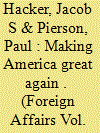

|
|
|
|
|
| Summary/Abstract |
At a debate [1]among the Republican presidential candidates in March, U.S. Senator Ted Cruz of Texas boiled down his campaign message to its essentials: “Here’s my philosophy. The less government, the more freedom. The fewer bureaucrats, the more prosperity. And there are bureaucrats in Washington right now who are killing jobs and I’ll tell you, I know who they are. I will find them and I will fire them.”
|
|
|
|
|
|
|
|
|
|
|
|
|
|
|
|
| 9 |
ID:
144610
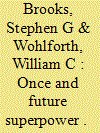

|
|
|
|
|
| Summary/Abstract |
After two and a half decades, is the United States’ run as the world’s sole superpower [1] coming to an end? Many say yes, seeing a rising China [2]ready to catch up to or even surpass the United States in the near future. By many measures, after all, China’s economy is on track to become the world’s biggest, and even if its growth slows, it will still outpace that of the United States for many years. Its coffers overflowing, Beijing has used its new wealth to attract friends, deter enemies, modernize its military, and aggressively assert sovereignty claims in its periphery. For many, therefore, the question is not whether China will become a superpower but just how soon.
|
|
|
|
|
|
|
|
|
|
|
|
|
|
|
|
| 10 |
ID:
144605


|
|
|
|
|
| Summary/Abstract |
In February, Moscow and Washington issued a joint statement announcing the terms of a “cessation of hostilities” in Syria [1]—a truce agreed to by major world powers, regional players, and most of the participants in the Syrian civil war [2]. Given the fierce mutual recriminations that have become typical of U.S.-Russian relations [3] in recent years, the tone of the statement suggested a surprising degree of common cause. “The United States of America and the Russian Federation . . . [are] seeking to achieve a peaceful settlement of the Syrian crisis with full respect for the fundamental role of the United Nations,” the statement began. It went on to declare that the two countries are “fully determined to provide their strongest support to end the Syrian conflict.”
|
|
|
|
|
|
|
|
|
|
|
|
|
|
|
|
| 11 |
ID:
144604
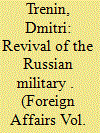

|
|
|
|
|
| Summary/Abstract |
After the collapse of the Soviet Union [2], the Russian military rotted away. In one of the most dramatic campaigns of peacetime demilitarization in world history, from 1988 to 1994, Moscow’s armed forces shrank from five million to one million personnel. As the Kremlin’s defense expenditures plunged from around $246 billion in 1988 to $14 billion in 1994, according to the Stockholm International Peace Research Institute, the government withdrew some 700,000 servicemen from Afghanistan, Germany, Mongolia, and eastern Europe. So much had the prestige of the military profession evaporated during the 1990s that when the nuclear submarine Kursk [3] sank in the Barents Sea in 2000, its captain was earning the equivalent of $200 per month.
|
|
|
|
|
|
|
|
|
|
|
|
|
|
|
|
| 12 |
ID:
144600


|
|
|
|
|
| Summary/Abstract |
Between 1996 and 2011, I served as a consultant to the Kremlin [1], advising Russian Presidents Boris Yeltsin, Vladimir Putin, and Dmitry Medvedev [2]. And yet even I can hardly claim to understand the real mechanisms of power in today’s Russia [3]. In the past few years, the country has reached a level of dysfunction that has pushed it to the brink, threatening its very existence. Ill-conceived military adventures, poor decision-making, and political skullduggery—sometimes of the lethal variety—have wreaked havoc on Russia’s economy and led to international isolation.
|
|
|
|
|
|
|
|
|
|
|
|
|
|
|
|
| 13 |
ID:
144603


|
|
|
|
|
| Summary/Abstract |
In recent years, many discussions of the Russian economy [2] have opened with an old joke. In the mid-1990s, John Major, the British prime minister, asked Russian President Boris Yeltsin [3] to characterize Russia’s economy in one word. “Good,” Yeltsin said. Major, seeking more detail, asked him to elaborate in two words. Yeltsin replied: “Not good.”
|
|
|
|
|
|
|
|
|
|
|
|
|
|
|
|
| 14 |
ID:
144599


|
|
|
|
|
| Summary/Abstract |
For half a millennium, Russian foreign policy [1] has been characterized by soaring ambitions that have exceeded the country’s capabilities. Beginning with the reign of Ivan the Terrible in the sixteenth century, Russia managed to expand at an average rate of 50 square miles per day for hundreds of years, eventually covering one-sixth of the earth’s landmass. By 1900, it was the world’s fourth- or fifth-largest industrial power and the largest agricultural producer in Europe. But its per capita GDP reached only 20 percent of the United Kingdom’s and 40 percent of Germany’s. Imperial Russia’s average life span at birth was just 30 years—higher than British India’s (23) but the same as Qing China’s and far below the United Kingdom’s (52), Japan’s (51), and Germany’s (49). Russian literacy in the early twentieth century remained below 33 percent—lower than that of Great Britain in the eighteenth century. These comparisons were all well known by the Russian political establishment [2], because its members traveled to Europe frequently and measured their country against the world’s leaders (something that is true today, as well).
|
|
|
|
|
|
|
|
|
|
|
|
|
|
|
|
| 15 |
ID:
144607


|
|
|
|
|
| Summary/Abstract |
Russian President Vladimir Putin’s seizure of the Crimean Peninsula [2] from Ukraine in early 2014 was the most consequential decision of his 16 years in power. By annexing a neighboring country’s territory by force, Putin overturned in a single stroke the assumptions on which the post–Cold War European order.
|
|
|
|
|
|
|
|
|
|
|
|
|
|
|
|
|
|
|
|
|